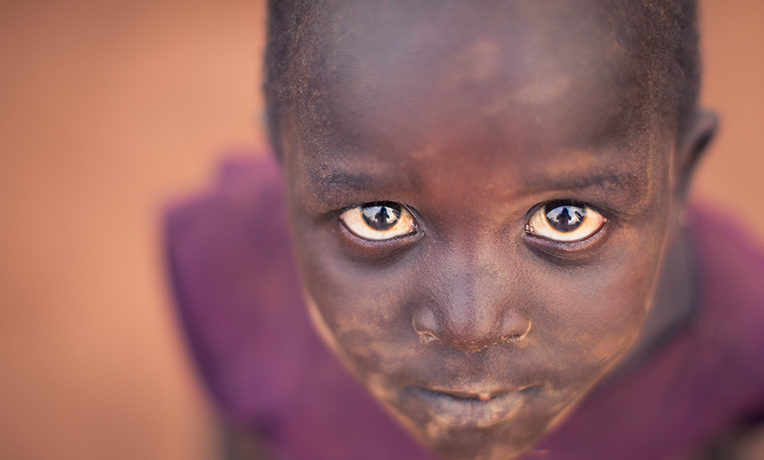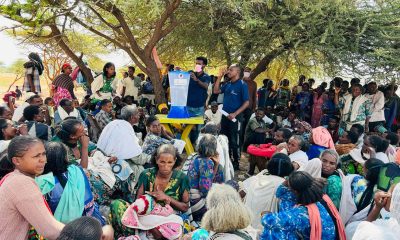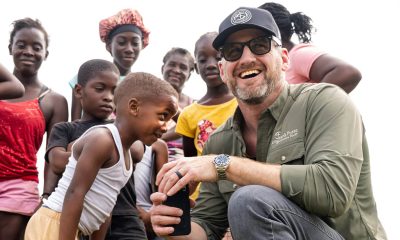Mission aviation provides critical support to the work of Samaritan's Purse in East and Central Africa
Anyone who’s ever undertaken a home-improvement project knows the first step to a job done right is having the correct tools.
Samaritan’s Purse now has those tools in place in Eldoret, Kenya. A new 15,600-square-foot hangar was completed last October and dedicated in March. The new facility houses three aircraft critical to our programs across East and Central Africa, and will allow us to continue our extensive efforts across the region and also expand operations.
“To be able to use aircraft in the Lord’s service, to be able to use these tools that God gave us—this hangar—to reach the lost and to spread the Gospel, it’s a privilege,” said Matt Olson, Deputy Director of Mission Aviation Services (MAS) for Samaritan’s Purse. “I’ve been flying over East Africa and turned around in my aircraft and seen a thousand kilos of Bibles translated for the first time in a new language. To take that into a village—bring God’s Word for the first time—it’s unbelievable. It’s hard to describe how satisfying that is.”
Samaritan’s Purse President Franklin Graham dedicated the aircraft hangar to God on March 3 in a ceremony attended by Kenyan political officials and Christian representatives from several countries in the region

MAS East Africa staff work hard to maintain our aircraft and keep them flying to deliver relief across the region.
MAS East Africa moved to Eldoret in late 2012. Construction began on the hangar in October 2013, and the team moved into the new home in October 2014. The facility was built on schedule and on budget using Kenyan construction companies and Kenyan labor.
In addition to providing needed office and storage space, the hangar increases maintenance efficiency, as staff members no longer have to battle with strong winds and heavy downpours.
“After over two years of doing all our maintenance out on the flight line, just to have a facility like this, it’s truly special,” said Drew Fitzpatrick, Program Director for MAS East Africa.
Fitzpatrick spoke for staff and pilots when he said serving with MAS East Africa offers a tremendous opportunity “to be the hands and feet of Jesus Christ and serve the lost and serve the needy.”
When Roads Won’t Do
Samaritan’s Purse aircraft based in Eldoret provide support to our work in Kenya, Uganda, South Sudan, the Democratic Republic of Congo, and other countries. They were instrumental in our response to the Ebola crisis in Liberia.
The four planes are a World War II-era DC-3, a King Air B200, and two Cessna 208B Grand Caravans. Each month, they fly about 200 hours and haul 30 tons of vital supplies.

The late Brian Stoltzfuz served as Director of Operations for our Mission Aviation Services in East Africa as well as a pilot for the DC-3.
The vast majority of our East Africa flights go across and into South Sudan, where we serve the water/sanitation, nutrition, medical, and spiritual needs of tens of thousands of refugees and displaced persons.
Roads into the areas where we work, if they exist at all, are rough to say the least during the dry season and impassable during the rainy season. In addition, significant security concerns—related to a bloody civil conflict—make some roads unsafe at any time. That’s why aviation is so important to our mission.
In Maban County, South Sudan, Samaritan’s Purse operates the only functioning surgical hospital in Upper Nile State. When seven tons of floor tile and an X-ray machine needed to be transported there, roads were not an option.
Aircraft also give our staff members a little extra peace of mind as they serve in remote and often dangerous locations.
The People Behind the Planes
Our Eldoret staff is a mix of Kenyan nationals and expatriates; men and women who serve as pilots, mechanics, line crew, office workers, and directors. The group is committed to shining the light of the Gospel of Jesus Christ throughout the region.
“I love this place not because of the building but because of the people and what we do,” Matt Olson said.

Kenyan pilot Amos Simiyu flies the Caravan into South Sudan to deliver needed supplies.
Amos Simiyu, a Kenyan pilot born about two hours drive from Eldoret, wanted to fly ever since his Air Force cousin let him climb into the cockpit of a military plane at age 8. But the armed forces were never an option for him. Instead he wanted to do the kind of aid work he now does.
“The most satisfying thing is flying to these difficult places,” he said. “The people, despite their troubles—being homeless, being in the camps with no food—they offer a smile. That, to me, is great.”
Above all, he values the opportunity to witness, as Samaritan’s Purse “is all about the Gospel.”
He still remembers one of his first chances to speak to a Muslim man in Sudan several years ago.
“We had a good discussion,” he said. “He did not accept Christ, but I know the seed was planted.”
Shaun Rix, an American citizen who was born in Zimbabwe, grew up in Australia, and lived in Canada, is another Samaritan’s Purse pilot based in Eldoret. Flying airplanes is an inherently stressful, life-and-death profession—especially when flying to destinations with armed conflict. It’s easy to understand why he views his job as a divine calling.
“If I didn’t firmly believe that I was doing God’s will, doing what God called me to do, I wouldn’t be here,” he said.
His roster of cargo shows just how valuable the work of MAS is in East and Central Africa.

Drew Fitzpatrick, Program Director for MAS East Africa, said, “Our personnel and our aircraft are essentially on-call for global response.”
Wilfred Ojwang, a native Kenyan, has worked his way up from the line crew to the role of mechanic.
“I tell you, I’m learning a lot,” he said. “I don’t take it for granted working with people who really know what they’re doing and are believers.”
Amos, Shaun, and Wilfred are just a few of the two dozen MAS staff in Eldoret, each with an important role to play. As Samaritan’s Purse now expands its efforts to meet the enormous needs of this region and beyond, the entire mission aviation staff in Kenya is eager to play a key role in extending the Gospel to some of the world’s toughest places, where there are no roads.
“That Your way may be known on earth, Your salvation among all nations” (Psalm 67:2, NKJV).
Please pray for our aviation staff and their families living in Kenya and for the safety of our teams as they travel by air.






